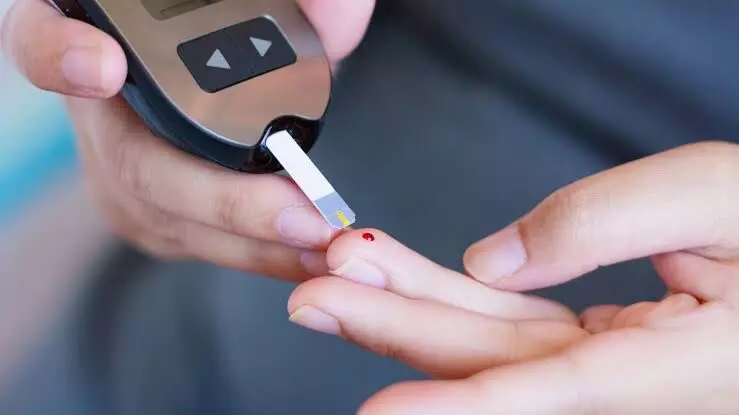World Diabetes Day: Over 101 million Indians suffer from disease; number to hit 134M
The number is expected to hit 134 million by 2045 due to population growth and aging
By Neelambaran A
World Diabetes Day: Over 101 million Indians suffer from disease; number to hit 134M
Hyderabad: India is the country with the second highest diabetes (type 2) population. About 11.4% of the total population comprising 101 million people suffer from the disease, as per a study held in 2023.
The number is expected to hit 134 million by 2045 due to population growth and aging.
Type 2 diabetes, resulting from the lack of generation of insulin from the human body or the inability to respond normally to insulin, is the most common type of diabetes. With the increasing prevalence of diabetes among the young population, experts call for increased awareness and screening, besides concentrating on reducing obesity and avoiding unhealthy lifestyles.
World diabetes day is observed annually on November 14, with ‘Breaking Barriers, Bridging Gaps’ as the theme for 2024.
Growing epidemic in India
With the number of diabetic patients increasing beyond 100 million, the condition is now considered an epidemic with a lot of challenges. Even as the number of prediabetic cases continues to spike, the undiagnosed cases remain a concern.
“Living with diabetes extends beyond managing blood sugar levels—it requires continuous lifestyle adaptations, mental resilience, and social support. The psychosocial aspect of diabetes is often overlooked; yet, stress, anxiety, and even depression can become companions in a patient’s journey”, says Dr Bipin Kumar Sethi, Senior Consultant and HOD Endocrinology, CARE Hospitals.
For effective diabetes management, a supportive environment with encouragement and understanding from people around becomes essential, since psychological factors too can impact the affected person.
“Extreme stress in daily life and workplaces, prolonged periods of inactivity, unhealthy eating habits—especially ordering food instead of cooking at home—are major contributing factors. The consumption of unhealthy foods like pizzas and burgers has increased, exacerbating the problem”, says Dr. G. Sandeep Reddy, Consultant Diabetologist at Kamineni Hospital.
Obesity, a major risk factor
Obesity has increased in India, among children and teens as per recent studies. The sedentary lifestyle and lack of physical activity are resulting in increased body weight among the different age groups.
“There has been a rampant increase in diabetes, especially in young individuals. This is mainly because of lifestyle changes in the past 1 or 2 decades. Though the patients exhibit symptoms when glucose levels are high, some people don't show any symptoms at all”, says Dr Sandeep Devi Reddy, Consultant Endocrinologist, KIMS Hospitals, Secunderabad.
The reduced impact of medications on obese people can hamper diabetes treatment, resulting in irreversible conditions.
“Obesity is a major concern since it causes insulin resistance which occurs when cells within the body don't respond to the insulin hormone, leading to high blood sugar levels. Everyone needs to maintain a normal BMI, eat a structured diet that contains all essential nutrients, and continue regular exercise, keeping them free from diabetes risk by up to 40%”, Dr. Ganapathi Sastry Nadiminty, Senior Diabetologist and Medical Director at GVK Health Hub.
Lifestyle and diet practices essential
The experts point to a sedentary lifestyle and poor physical activity among the younger population, besides stress, lack of sleep, smoking, and alcohol consumption being the contributing factors.
“Simple dietary changes like portion control and healthy food choices may be considered for those with type 2 diabetes who are not taking insulin. Carbohydrate intake from vegetables, fruits, legumes, whole grains, and dairy products, with an emphasis on foods higher in fiber and lower in glycemic load, is preferred over other sources, especially those containing added sugars”, says Dr Sandeep Devi Reddy.
Experts also suggest an intake of healthy snack options including fruits and sprouts, besides depending on monounsaturated and polyunsaturated fats to improve glucose metabolism.
Physical activity is suggested for people with diabetic and prediabetic conditions, since exercises help in improved glucose control, cardiovascular fitness, and quality of life. Moderate-intensity exercise of 150 minutes or 75 minutes of vigorous exercise at least three days a week is recommended.
Long-term complications
Physical, mental, and social problems are a concern of diabetic patients in the long run, as eyes, kidneys, lives, and heart can be damaged, particularly when the diabetes is uncontrolled.
“Both high and low blood sugar levels can impair brain function, leading to mental health issues. Upon being diagnosed with diabetes, individuals may suddenly experience depression and difficulty socializing”, says Dr Sandeep Reddy.
Reversing diabetes
Type 2 diabetes is reversible for some individuals, while medications remain the only solution for a vast majority. However, a strict diet, active lifestyle, and exercise are essential for those individuals who manage to reverse diabetes.
“It is possible to reverse diabetes for some individuals, eliminating the need for future medications. This is mainly achievable for younger people, those who are overweight, have high C-peptide levels or are on one or two medications. Individuals using insulin have a lower chance of reversing diabetes”, Dr. G. Sandeep Reddy said.
Several homemade recipes and recommendations without scientific backing are being circulated on social media, which can lead to further complications in managing diabetes. A scientifically proven approach, with adequate consultation and frequent check-ups, can only help in the process.
“This World Diabetes Day, let’s commit to a healthier future. By staying informed, choosing interventions that have a sound scientific basis, we can work towards an India with healthier, diabetes-aware communities”, Dr Bipin Kumar Sethi says.